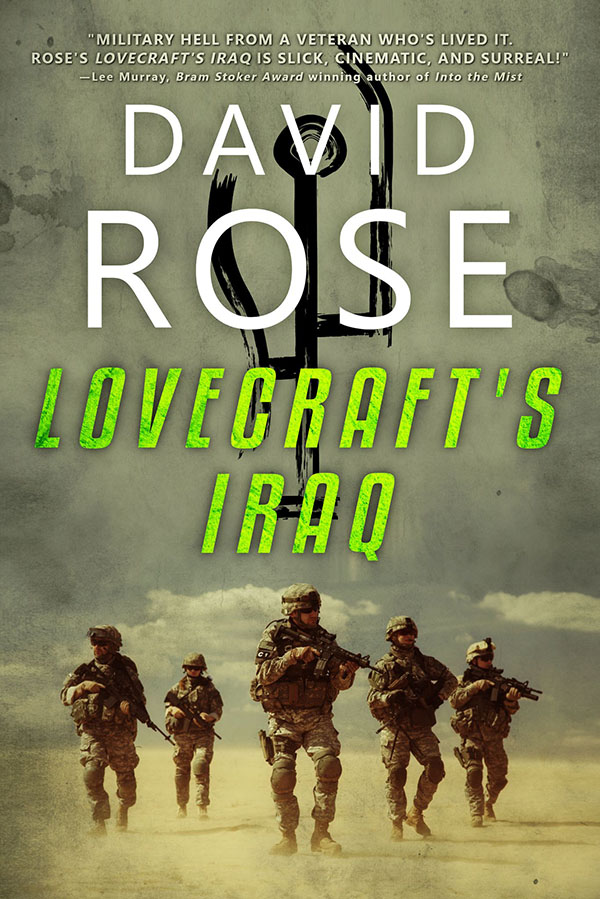
Welcome to my weekly Author Spotlight. I’ve asked a bunch of my author friends to answer a set of interview questions, and to share their latest work.
Today: David Rose is the author of, among others, The Scrolls of Sin and Lovecraft’s Iraq. The latter has been included in the 2022 HWA Bram Stoker Award® Reading List. His forthcoming work includes “Shain and Cinnastasia” in Superstition from Redwood Press, as well as the essay titled “McNaughton’s Witches” in S.T. Joshi’s Penumbra journal.
Thanks so much, David, for joining me!
J. Scott Coatsworth: If you could sit down with one other writer, living or dead, who would you choose, and what would you ask them?
David Rose: Much like Chuck Palahniuk not going a single interview without mentioning Amy Hempel at least once, same goes for me and the late Brian McNaughton. The man was a genius. Making matters more interesting, he is rather unknown. His The Throne of Bones washed over me like wine. I could actually feel my brain falling in love with every word as I fell through the pages and walked the streets of Crotalorn. He died before he could finish The Deposition of Leodiel Fand—thus my most urgent question would be “How does this beautiful thing end?!” After that, I’m sure I would pester him with questions about process. I imagine him getting irritated after a while then me doing things like sweeping his floor and taking out the trash like the I’m-not-leaving apprentice I would so definitely be.
JSC: How would you describe your writing style/genre?
DR: Florid, for sure, if working in a secondary world. Stories there I’d say are the love child of Dark Fantasy and Weird Fiction. My colloquial stuff is pretty straightforward though. This work focuses mainly on military stuff (I’m a vet). Being that Marines are dealing with magic and monsters, embedding a sense of realism via prose is really important to me.
JSC: What’s the weirdest thing you’ve ever done in the name of research?
DR: Ha! I don’t know if this qualifies as research exactly, but I climbed to the top of a large tree once to read Bilbo’s experience in the Mirkwood canopy.
JSC: What is your writing Kryptonite?
DR: I have found for me to work at my best, which is to say the level we all must aim for each day, I cannot—can—not—have much to do that requires me to hop out of my mind. I try to knock out all my worldly affairs one day (groceries, appointments, obligations with the HOA) so the day after I can stay swimming in the cauldron. Otherwise, I seem to operate piss-poor in both worlds; the HOA meeting and the Word doc.
JSC: If you could tell your younger writing self anything, what would it be?
DR: The book business is exactly that. No one owes you a thing, young man, and it’s the obsessive desire to master the craft that you must realize now is your ultimate driving force.
JSC: How long do you write each day?
DR: I tend to work in brief, punitive prison workouts. It is often debated how long a writer writes if for hours on end that pensmith is deliberating over a single paragraph, a fork in the road they did or did not see coming. If we include that I’d say I write darn near 24 hours day, but if we are talking clocked in at the keyboard, hmm, I’d say maybe 2 or 3.
JSC: Do you read your book reviews? How do you deal with bad or good ones?
DR: I do. Let’s be honest, we wanna see what folks have to say. The critical ones I look for some sort of overlay: is there an area I thought was good but apparently isn’t registering? That type of thing. The good ones are great to see, but I do have to admit the dopamine hit isn’t as strong as perhaps I once thought it would be. The true rush is getting something right, that sense of discovery, those rare ah-ha! moments when what prompts us practically steals our hands.
JSC: What do you do if you get a brilliant idea at a bad time?
DR: Which is usually the case, right? I talk the note into my phone or scribble it down in one of the yellow note pads that seem to orbit me.
JSC: Where do you like to write?
DR: I used to try to cultivate my “writing areas” and each time, damn it, the muses disapproved. My cluttered kitchen table now serves them well.
JSC: What are you working on now, and what’s coming out next? Tell us about it!
DR: Two things. Both set in the world of Mulgara. One is currently titled The Tale of Pirate Bly, where a young landlubber turned pirate deals with the fact that he perhaps picked the wrong ship. The other is a short story I’m particularly enjoying: Aubletta, about a young girl who lives on the edge of dreaded wood, and about many things in my family it took me decades to realize.
And now for David’s latest book: Lovecraft‘s Iraq:
The year is 2005. Blood from the Second Battle of Fallujah still dries on the farmlands of the Zaidon. But for Stygian 2-3, a young team of Recon Marines, the war is anything but over.
Plaguing their battlespace is an ancient evil. Those who volunteered to ensure “Iraqi Freedom” must fight not only anti-Coalition forces, but powers older than the United States, democracy… the world itself.
“Military hell from a veteran who’s lived it, Rose’s Lovecraft’s Iraq is slick, cinematic, and surreal. An action adventure of the heroes who give their all, even when there is no winning.” — Lee Murray, two-time Bram Stoker Award®-winner, and author of Into the Mist
Get it On Amazon
Excerpt
“You expect me…” the groggy company commander declares, waving his hand at the other staff seated at the table. “You expect us, Corporal Silver, to actually believe that?”
Oppressing the room is also Lieutenant Ashton, their silent platoon sergeant, and the first sergeant in charge of all Stygian platoons. On the other side of the company office, backs against the wall, is Stygian 2-3, looking down at their boots. “You’re gonna try to pull the wool over everyone’s eyes and stick to every single radio went down, all at once?”
“Sir,” Silver sighs. He looks up from the cement, glancing at the gold maple leaf on the company commander’s collar before looking him in the eye. “I know how crazy it sounds, but all our radios—even my watch—everything went down when—”
“When what, Corporal?” the major snarls. “When creepy lights ‘faded away’?”

